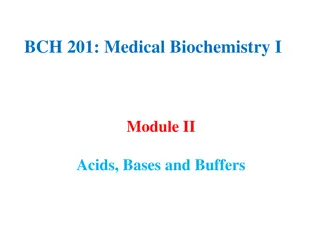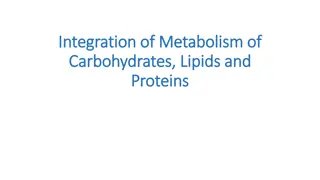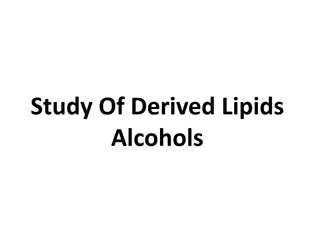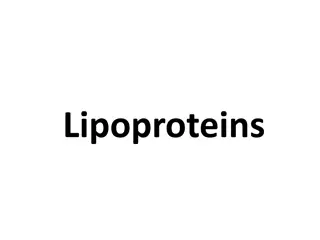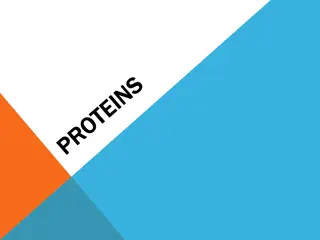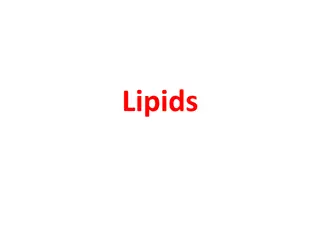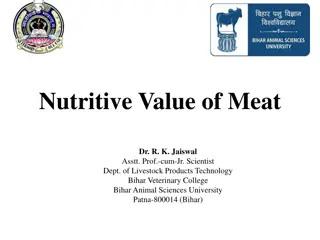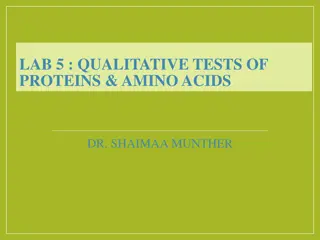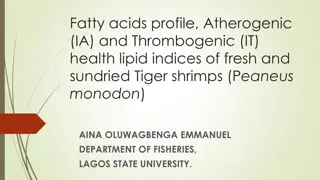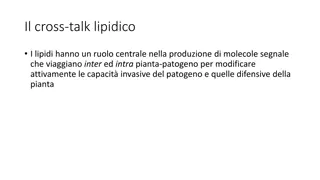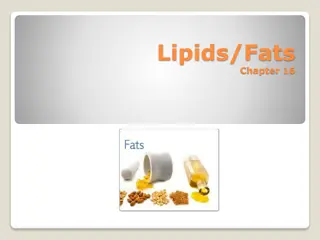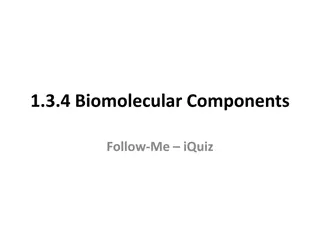Understanding Fatty Acids and Derived Lipids
Explore the world of fatty acids and derived lipids through detailed images and descriptions. Learn about the chemical structure, composition, and various types of fatty acids found in the human body. Discover how fatty acids are essential components of lipid forms and play a crucial role in biological processes.
Download Presentation

Please find below an Image/Link to download the presentation.
The content on the website is provided AS IS for your information and personal use only. It may not be sold, licensed, or shared on other websites without obtaining consent from the author. Download presentation by click this link. If you encounter any issues during the download, it is possible that the publisher has removed the file from their server.
E N D
Presentation Transcript
FATTY ACIDS( FAs) Class- Derived Lipids BASIC COMPONENT OF LIPID FORMS
Fatty Acids Are Derived Lipids Fatty acids are of Class Derived Lipids: Since Fatty acids are Hydrolytic products of Simple and Compound Lipids.
Fatty Acids (FA) Fatty Acids (FA) are relatively or potentially related to various Lipid structures. Simple Lipids Compound Lipids Derivatives of Lipids
Structure And Chemical Nature Of Fatty Acids
Fatty acid Structures Has Varied Hydrocarbon Chains The Hydrocarbon chain of each Fatty acid is of varying chain length (C2 - C26).
Human Body Fatty Acid From C2-C26 S.No Fatty Acid Name Fatty Acid Structure has Carbon atoms C2 C3 1 2 Acetic Acid Propionic Acid 3 Butyric Acid C4 4 Valeric Acid C5 5 6 7 Palmitic Stearic Oleic C16 C18 C18
S.No Fatty Acid Name Fatty Acid Structure 8 Linoleic Acid C18 9 Arachidic Acid C20 10 Arachidonic Acid C20 11 Behenic acid C22 12 Lignoceric acid C24 13 Cerotic acid C26
Fatty acid structure have two ends: Carboxylic group(-COOH) at one end (Delta end denoted as /Alpha end ) Methyl group (-CH3) at another end (Omega end denoted as )
Carboxylic Acid Functional Group Of Fatty Acid
Fatty Acids are Defined as: Fatty acids are chemically Organic acids With Aliphatic Hydrocarbon chain (of varying length C2 to C26) with Mono terminal Carboxylic acid group as functional group.
Different Forms Of Fatty acids In Body
Free Fatty acid /Unesterified Fatty acid Fatty acid who has free Carboxylic group Fatty acid not reacted and linked to an Alcohol by an Ester bond.
Esterified Fatty acid/Bound form of Fatty Acid Fatty acid has no free Carboxylic group Fatty acid is linked to an Alcohol with an Ester bond.
Classification of Fatty acids Biomedically Important Fatty Acids Based On Six Different Modes:
Classification of FAs Based on Six Modes: 1. Total number of Carbon atoms in a Fatty acid structure 2. Hydrocarbon chain length of Fatty acid 3. Bonds present in Fatty acid 4. Nutritional requirement of Fatty acid 5. Chemical Nature and Structure of Fatty acids 6. Geometric Isomerism of UFAs
Fatty acids Based on Total Number of Carbon atoms
Even numbered Carbon Atom Fatty acids (2,4,6,8,16,18,20 etc) Odd numbered Carbon Atom Fatty acids (3,5,7,---)
Most naturally occurring /human body Fatty acids are even carbon numbered FAs. Since biosynthesis of Fatty acids uses 2 Carbon units Acetyl-CoA (C2).
Examples of Even Carbon Numbered Fatty acids: Butyric Acid (C4) Palmitic Acid (C16) Stearic Acid (C18) Oleic Acid (C18) (Most Common) Linoleic acid (C18) Linolenic Acid (C18) Arachidic acid (C20) Arachidonic acid (C20)
Odd Carbon numbered Fatty acids are less related to human body Example of Odd carbon Fatty acid associated to human body Propionic Acid ( 3C)
Fatty acids Based on Nature and Number of Bonds present
Saturated Fatty acids(SFAs) Fatty acids having single bonds in hydrocarbon chain structure. Examples: Acetic acid (C2) Butyric acid (C4) Palmitic acid (C16) Stearic acid (C18) Arachidic acid(C20)
Unsaturated Fatty acids (UFAs) Fatty acids having double bonds in its structure. Types of UFAs: Monounsaturated Fatty acids (MUFAs) Polyunsaturated Fatty acids (PUFAs)
Human body have no Enzyme system to introduce double bond beyond Carbon atom 10 in the hydrocarbon chain. Hence PUFAs are not biosynthesized in human beings.
Monounsaturated Fatty Acids(MUFAs): MUFAs have one double bond in a fatty acid structure Examples of MUFAs : Palmitoleic acid (C16:1;9) ( 7) Oleic acid (C18:1;9)( 9) Erucic acid (C22:1;9)( 9)
Poly Unsaturated Fatty Acids (PUFAs): UFAs with two or more double bonds in the structure are termed as PUFAs. Examples Of PUFAS: Linoleic(18:2;9,12) ( 6) Linolenic(18:3;9,12,15) ( 3) Arachidonic(20:4;5,8,11,14) ( 6) Timnodonic (20:5;5,8,11,14,17) ( 3) Cervonic/Docosa Hexaenoic acid(DHA)(22:6;4,7,10,13,16,19) ( 3)
Remember Unsaturated Fatty acids Double bonds are: Weaker /unstable bonds. Get easily cleavable/metabolized
More the degree of Unsaturation in Fatty acids. More is the unstability of Fatty acids.
Saturated Fatty acids structures are Straight. Unsaturated Fatty acids structures are bent (Kink).
Saturated FAs: with straight structures are tightly packed together. Unsaturated FAs: with bent structures are not compact and has no tight packing.
More the degree of unsaturation in FA/More double bonds in FA structure More is the bent of Fatty acid structure.
Fatty acids Based on the Nutritional Requirement
Nutritionally Essential Fatty acids: Fatty acids not biosynthesized in human body and indispensable through nutrition/diet are termed as Essential Fatty acids. PUFAS are nutritionally essential Fatty acids.
Examples of Essential Fatty Acids/PUFAs: Linoleic Linolenic Arachidonic acids Timnodonic and Cervonic
Nutritionally Non essential Fatty acids: Fatty acids which are biosynthesized in the body and are nutritionally non essential Fatty acids. Saturated Fatty acids and MUFAs are non essential Fatty acids.
Examples Of Non Essential Fatty Acids Palmitic Stearic Oleic acid



